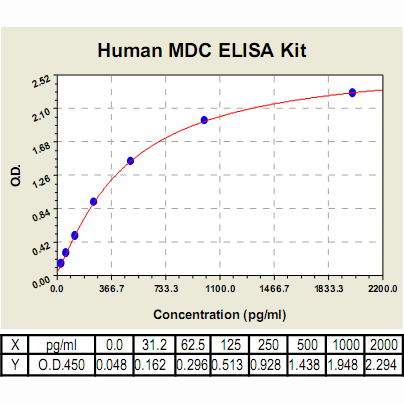MDC ELISA Kit, Human |
 |
BACKGROUND Macrophage-derived chemokine (MDC) is a member of the CC chemokine family. is constitutively expressed by dendritic cells, B cells, macrophages, and thymic medullary epithelial cells, whereas monocytes, NK cells, and T lymphocytes produce MDC only upon appropriate stimulation.1 MDC shares only limited homology with other chemokines. It is most similar to thymus- and activation-regulated chemokine (TARC), with 37% identity. As shown by tissue Northern blots, MDC also shares a very similar expression pattern with TARC, showing high levels in thymus and very low expression in other tissues. The receptor for both MDC and TARC is CCR4, a G protein-coupled receptor expressed primarily on the Th2 subset of T lymphocytes and on developing T cells within the thymus. Since MDC and TARC are both expressed in the thymus, one role for these chemokines may be to attract CCR4-bearing thymocytes in the process of T cell education and differentiation.2 MDC is also chemotactic for IL-2-activated NK cells, dendritic cells, and monocytes. In vivo, MDC appears to be involved in the migration of developing T cells in the thymus, and of distinct subsets of mature T cells in the periphery. In the context of pathophysiology, MDC may play an important role in the migration of Th2 cells during allergic inflammation, and of CLA+ T cells to the skin in conditions such as psoriasis.3 In addition, MDC is processed by the surface serin protease dipeptidyl-peptidase IV/CD26. CD26 removes the N terminal dipeptyde gly-pro, as expected on the basis of the specificity of the classically defined enzyme specificity. Subsequently, with a slower kinetics, MDC (3–69) is processed by removal of the tyr-gly dipeptide with generation of MDC (5–69). CD26-processed MDC (5–69) lost the capacity to interact with CCR4 and had little chemotactic activity on lymphocytes and dendritic cells. However, MDC (5–69) was as active as MDC (1–69) on monocytes.4
REFERENCES
1. Galli, G. Et al: Eur. J. Immunol. 30:204-10, 2000
2. Imai, T. et al: J. Biol. Chem. 273:1764-68, 1998
3. Mantovani, A. et al: J. Leuk. Biol. 68:400-8, 2000
4. Struyf, S. et al: J. Immunol. 161:2672-5, 1998
2. Imai, T. et al: J. Biol. Chem. 273:1764-68, 1998
3. Mantovani, A. et al: J. Leuk. Biol. 68:400-8, 2000
4. Struyf, S. et al: J. Immunol. 161:2672-5, 1998
Products are for research use only. They are not intended for human, animal, or diagnostic applications.
Параметры
Cat.No.: | CL0446 |
Target Protein Species: | Human |
Range: | 31.2pg/ml – 2000pg/ml 15.6pg/ml-1000pg/ml |
Specificity: | No detectable cross-reactivity with any other cytokine |
Storage: | Store at 4°C. Use within 6 months. |
ELISA Kits are based on standard sandwich enzyme-linked immunosorbent assay technology. Freshly prepared standards, samples, and solutions are recommended for best results.
Документы
Информация представлена исключительно в ознакомительных целях и ни при каких условиях не является публичной офертой








